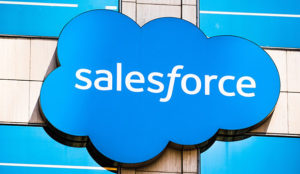
Salesforce last week announced its selection of Amazon Web Services as its preferred public cloud infrastructure provider. The deal is worth US$400 million.
“For the first time, we’ll be able to deliver our core services — including Sales Cloud, Service Cloud, App Cloud, Community Cloud, Analytics Cloud and more — for our international infrastructure expansion,” said Salesforce cofounder Parker Harris. “This will enable us to bring new infrastructure online more quickly and efficiently in select international markets.”
The companies are already tight. Many Salesforce services, including Heroku, Marketing Cloud Social Studio, SalesforceIQ and the Salesforce IoT Cloud already run on AWS infrastructure, and Salesforce is Amazon’s company-wide customer platform.
Amazon “has sophisticated and robust enterprise capabilities for supporting the needs of Salesforce’s growing global customer base,” Harris said. “AWS will help accelerate its ability to bring new infrastructure online more quickly and efficiently.”
AWS will be used in select international markets to be disclosed later, he noted. However, it will continue to invest in its own data centers.
Salesforce customers should “make their purchase decisions based upon features that are currently available,” Harris cautioned, adding that the company would “continue to deliver the same secure, trusted, reliable and available cloud computing services to customers regardless of the underlying structure.”
Going Global
“The news seems to be primarily about fueling Salesforce’s international expansion,” said Chris Chute, a research VP at IDC.
“This is sensible, since established markets like the United States are viewed as maturing very quickly when it comes to cloud IT service adoption],” he told CRM Buyer.
If Salesforce is looking for a long-term public cloud infrastructure partner, “AWS makes sense in that Amazon doesn’t have competitive SaaS offerings,” Chute pointed out.
What About Oracle?
Salesforce and Oracle in 2013 announced a comprehensive nine-year partnership, under which Salesforce would standardize on Oracle Exadata hardware running Oracle’s Linux, as well as use the Oracle database and Oracle’s Java middleware platform.
Further, Oracle would integrate Salesforce.com with its Fusion HCM and Financial Cloud, and Salesforce would implement Fusion HCM and Oracle Financial Cloud apps. Oracle would provide the core technology to power Salesforce.com’s applications and platform.
So, is Salesforce shifting away from Oracle?
As Salesforce’s user base expands into more IoT deployments and more advanced analytics requirements, AWS “will offer a mature system to support these applications with very high levels of performance, which will let Salesforce designate more investments into its applications instead of into its data center footprint,” Nucleus Research Senior Research Analyst Anne Moxie told the E-Commerce Times.
Oracle theoretically could have taken up the load Salesforce will run on AWS onto the Oracle Cloud, said Holger Mueller, a principal analyst at Constellation Research. “They specifically said they can attract AWS load, but I guess they weren’t ready.”
Also, Salesforce “does not want more Oracle dependency,” he told CRM Buyer.
Salesforce “didn’t say whether they’d rearchitect for AWS and AWS databases, or run Oracle on AWS,” Mueller noted.
“Salesforce has customers using Oracle software and database services in addition to Salesforce, so I can’t see [it] leaving Oracle behind completely,” contended Seth Lippincott, a research analyst at Nucleus Research.
Salesforce will remain technology-agnostic “so it can cater to customers regardless of what service providers they prefer,” he told CRM Buyer.
The Impact of the Shift
Salesforce has a very large footprint, which means it needs a lot of load right away,” Mueller noted. “There’s nothing better than to have a large ISV load that can be shifted into countries due to EU Safe Harbor issues. The Amazon flywheel gets more fuel.”
AWS will get more economies of scale and protection from the competition, he said, because “the Salesforce load isn’t going to Azure, Google, Oracle or IBM.”
Salesforce’s move “could cause cost price wars, to the benefit of customers,” Lippincott argued. “There’s currently an arms race in services and for customers in the public cloud space.”
Customers “won’t care what database Salesforce runs on so long as it works,” he said. “That’s bad news for Oracle.”






















































